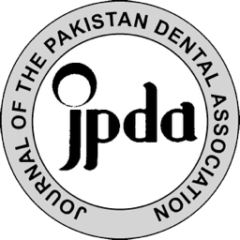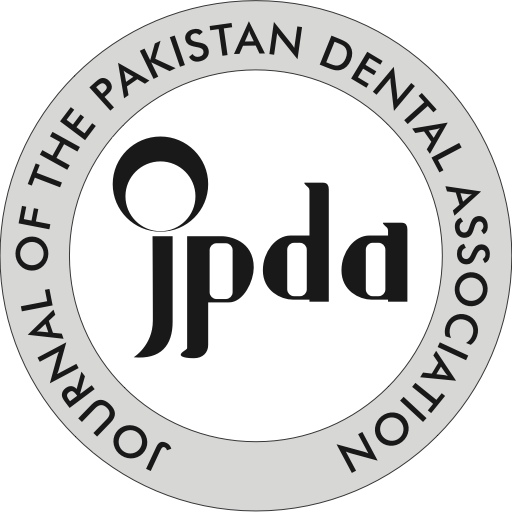
Ayyaz Ali Khan   BDS, MSc, PhD, MFGDP
We, the health professionals generally and oral health professionals particularly are in the middle of what I believe to be the most uncertain and challenging decade for health care workers.
With increasing unemployment, continued inflation, cutbacks in development grants and massive deregulation (18th Amendment) have resulted gradual reversal and annihilation of many federal policies and programs. In no sector it is more visible than in the health sector and the impact of these factors on oral health care delivery, education and the profession as a whole has coming to a stage of total obliteration.
The results of these changes and many more is being felt by the entire population; food, clothing, shelter and healthcare are becoming more and more difficult to obtain and manage. Except for a privileged few, the entire population is and will witness a decrease in quality of life; some suffering more than the others.
In the present situation let us try and asses the problem and how they relate to the future of the profession in the country.
- Access to health is considered a basic human right; the public sector and the non-government organizations are striving to provide round the clock health cover to its population. It may be inadequate, but, the effort is there. Yet, there is no national or provincial oral healthcare policy or program. The sporadic dental cover in some health care facilities is available only in the mornings with little or no equipment, instrument and material support.
- Majority of the adult population and more than half the child population has dental decay; over 80% of the people over 45 years of age have periodontal disease; and more than 20% of the population over 60 is edentulous. We have one of the highest rate of oral cancer in the world.
- More than 90% of all dental disease in untreated; only 6% edentulous wear dentures and late reporting of oral cancer is highly prevalent. There is probably a major divide in the unmet needs of high income group and the low income population; as 90% 0f the dental facilities are located in upper and upper middle class areas leaving the low income areas at the mercy of unqualified practitioners.
- We can safely envisage that less than 5% of the Pakistani’s have access to complete dental care and more than half of the entire population has never visited a dental surgeon.
Regrettably, majority of the decision makers, including some healthcare professionals do not appreciate the extent unmet oral health needs of our people and how these unmet needs affect the quality of life of the individual, community and population at large. Everyone knows that food, shelter, clothing and a job are of utmost importance; but has anyone pointed out that if you have food and no teeth to chew them down; and the fact that if you have a toothache one is not bothered about their food or job. That the quality of life of an individual is seriously hindered if he/she does not have a health oral cavity.
Today, many dental practitioners are concerned with lack of patients while at the same time there is a major bulk of unmet dental needs. There are clear indications that hard economic times are a near reality for many a dental practitioners unless they are willing to relocate to less lucrative areas and are able to provide affordable dental care to an average Pakistani.
Access to affordable dental care remains out of reach for majority of Pakistanis. Public Health sector is marred by lack of appropriately trained manpower, equipment and material; private sector is financially out of reach for majority of the population; most of the health insurances and company health cover allow very basic dental treatment, restricted in majority of the cases to emergency pain relief, “Gum Treatment†and extractions. Hence, majority of the population has to dig into their already shallow pockets for dental care.
The public sector coverage in the rural areas start at first referral level; the RHC–638 in number for 60% of the population – one dentist for a population of almost 200,000. The irony is that the dental material is not in the essential drug list of the RHC meaning that even if there is a dentist posted in these centers they cannot function.
It is a discredit to us as a profession in general and to our ethics of social responsibility that the mainstream Pakistanis still lack access to basic oral health care. Children, adults and elderly miss sleep, school and work due to pain from untreated dental disease. They are unable to eat properly; they cannot smile without fear. Pain from untreated dental decay results in lost school and work hours; many with tooth pain seek care in public sector hospitals, most of which are not well equipped to handle high demand of dental emergencies.
Should We be Concerned?
We have a responsibility towards the public to provide them affordable to free dental care. It is time that the public and private sector join hand to fulfill their social responsibilities. This partnership can result into community outreach programs – taking dental services to those most in need; innovative education and service delivery programs; and meaningful strategies for the future. Unless and until we show our concern for the betterment of oral health of the masses – by our actions and not mere words; dentistry as a profession is destined to doom.
As a starter, we can join hands to organize oral health camps in the low income and underprivileged areas. Not just lectures and distribution of toothpaste as a onetime effort, but actual treatment. It has been seen that primary preventive strategies work better if they are combined with at least secondary prevention viz-a-viz halting the disease process. They work best if combined with secondary and tertiary prevention i.e. not only restricting a disease process but also restoring function.
What are We Doing as an Organized Profession?
If we have to survive as a profession, we need to get organized; Pakistan Dental Association has no option but to take a leadership role. Much more than organizing a conference a year.
- The Association need to convince the decision makers to start morning and evening shifts at all existing facilities. Government hospitals, Dental Colleges and other health care institutions (Public and Private). This will not only make institutionalized affordable oral healthcare available to the masses for a much longer duration and address the access issue of taking leave from the job or school to visit a dentist at an institute in the mornings only; this step will also double the job opportunity for dentist overnight.
- A working paper can be produced and submitted to the PMD&C and the relevant health authorities and lobby for implementation. This step does not require any capital expense and can be implemented by earmarking recurrent costs in terms of salaries and material.
- Similar working paper can be developed to bring dental medicaments and material in the essential drug list of RHC dental units. The Association then needs to lobby implementation. This step will ensure treatment as available at this first referral center to start off with.
- Just getting policy decision dental services at Basic Health Units (BHU) can create 4996 new jobs for dentists and bring down the dentist to population ratio in the rural area from 1:200,000 to 1:3500. This action will not only provide oral health cover to the grass root level but will also be a positive step to curb quackery. It may take at least a decade to happen but for it to happen even in a decade the ball has to be set in motion today.
- The Association has to negotiate with the government to withdraw taxes on dental equipment, medicaments and material to bring down the cost of delivering dental care.
- Toothpaste is taxed at 35%; if that can be taken away we can offer affordable toothpaste to our people to global standard which dictates that the price of 100 gm. of toothpaste be the same as one kilogram of sugar. • Diverting a mere one percent of tax collected by the government on sugar and it’s dependant industries towards creating a dental/oral health budget in all public sector facilities can go a long way in establishing and running dental services in these institutions.
The Association has to position itself in a way that it is consulted in all policy matters regarding oral health; be it dental education or oral healthcare delivery.
This is the only way it will be able to safeguard the interests of the profession and ensure its survival.
Prof. Ayyaz Ali Khan
Editor in Cheif
1. Professor of Dentistry & Head of Oral Health Sciences,
Federal Postgraduate Medical Institute,
Shaikh Zayed Medical Complex,
Lahore, Pakistan
*Correspondence to Ayyaz Ali Khan : ayyazalikhan@iadsr.edu.pk


